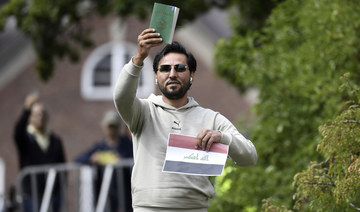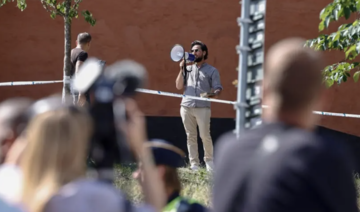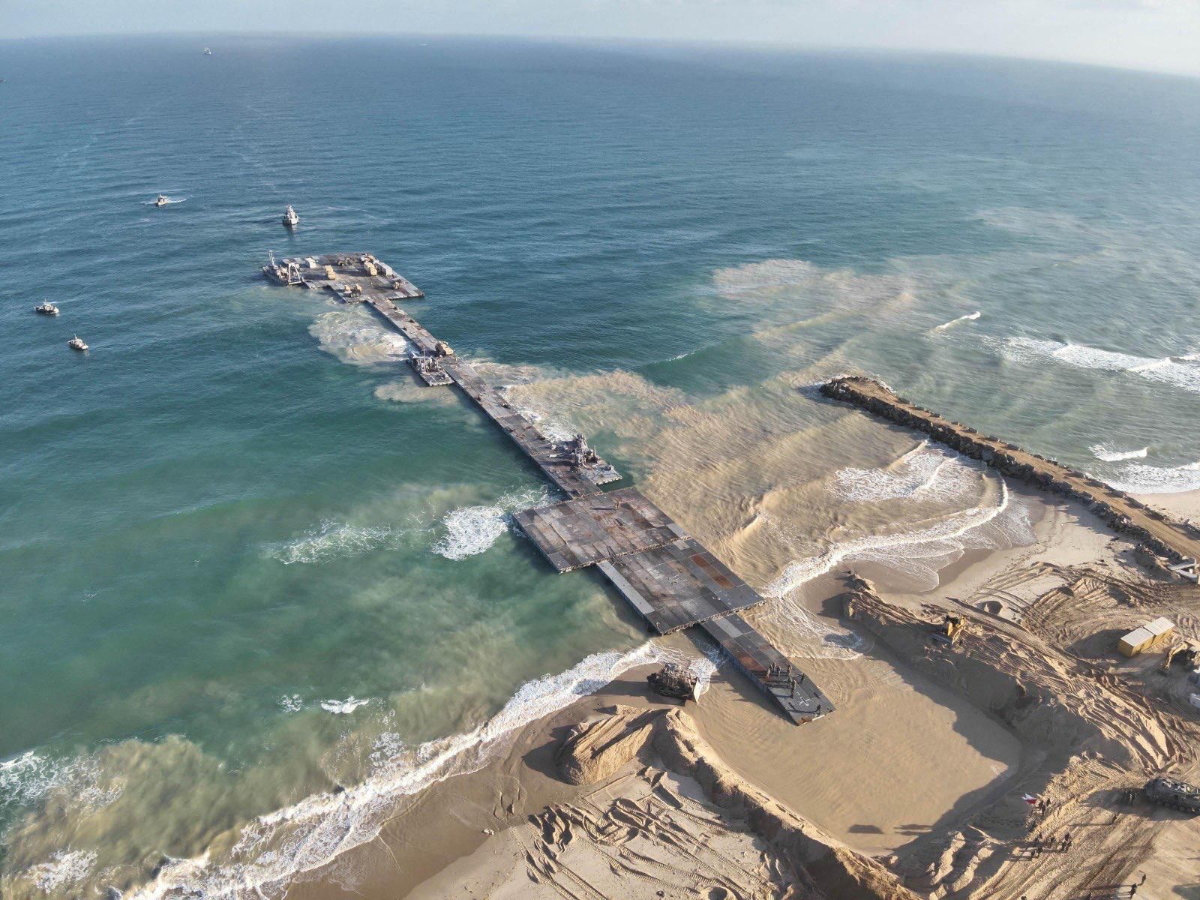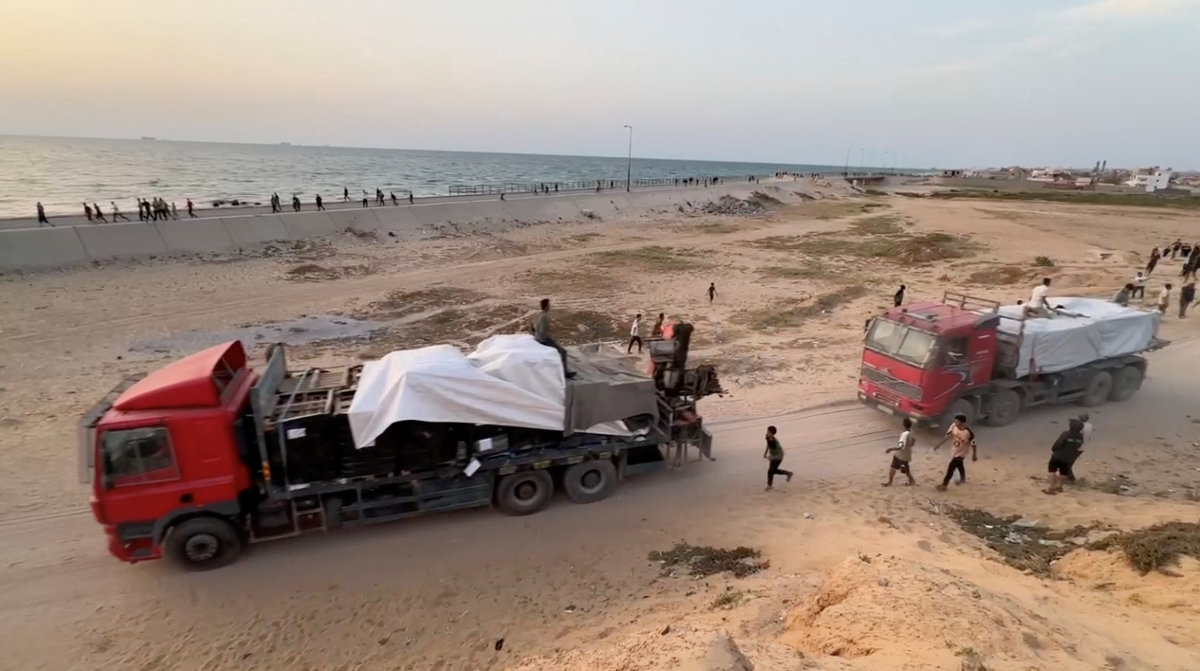TEHRAN/BAGHDAD: Iran announced late Friday that it will not allow a new Swedish ambassador into the country amid a row over Stockholm permitting protests in which the Qur'an was desecrated.
“The Swedish ambassador’s term in Tehran has ended and, according to the president’s order, until the Swedish government takes a serious action over the desecration of the Holy Qur'an, we will not accept the new Swedish ambassador,” Foreign Minister Hossein Amir-Abdollahian told state television.
“The Iranian ambassador will not be sent to Sweden,” he added.
His announcement came after an evening protest in the capital Tehran that saw hundreds of demonstrators gather outside the Swedish embassy.
The protest became a sit-in, with the crowd throwing eggs and tomatoes at the building and vowing to stay put until the Swedish ambassador is expelled from Iran, before later dispersing.
Earlier, protesters gathered after Friday prayers, waving Iranian flags and carrying copies of Islam’s holy book.
“Down with the United States, Britain, Israel and Sweden,” protesters chanted, as some in Tehran burned the Swedish flag.
Similar demonstrations were held in other major Iranian cities including Tabriz in the northwest, Mashhad in the northeast and Isfahan in the center of the country.
The rallies came amid heightened tensions between Stockholm and Muslim countries over a Sweden-based Iraqi refugee who last month burnt pages of the Qur'an outside Stockholm’s main mosque.
In the latest such incident on Thursday, the refugee, Salwan Momika, stepped on the Qur'an but did not burn it. His act triggered renewed condemnation across the Muslim world.
Iran had already summoned the Swedish ambassador on Thursday to protest against Stockholm allowing Momika’s actions on free speech grounds.
Amir-Abdollahian spoke to his Swedish counterpart Tobias Billstrom by phone on Friday.
“The person who committed this unforgivable insult must be arrested, tried, and held accountable for his actions,” a foreign ministry statement quoted him as saying.
Baghdad assures foreign diplomatic missions
In Iraq, the government sought to reassure diplomatic missions in the country of their security on Saturday, saying it would not allow a recurrence of the storming of the Swedish embassy.
The statement from the Foreign Ministry came a day after hundreds of protesters stormed the Swedish embassy in Baghdad, setting it on fire in protest against plans to burn a copy of the Qur'an in Stockholm. Iraq also expelled the Swedish ambassador.
“The Iraqi government is fully committed to the Vienna Convention that regulates diplomatic relations among countries and assures all resident diplomatic missions of their security and protection,” the ministry said.
“What happened to the Embassy of the Kingdom of Sweden in Baghdad cannot be repeated, and any similar act will be subject to legal accountability,” it added.
Sweden on Friday cited security concerns in a decision to relocate embassy staff after the attack on its embassy compound.
“The embassy’s operations and its expatriate staff have been temporarily relocated to Stockholm for security reasons,” the Swedish foreign ministry said.
Iraq condemned the embassy attack but retaliated against the Stockholm protest by expelling its ambassador, vowing to sever ties and saying it was suspending the operating license of Swedish telecom giant Ericsson.
But an adviser to the premier told foreign journalists Friday that contractual agreements would be respected, and “no company has been suspended, not even Ericsson.”
In Baghdad’s Sadr City protester Sabbah Al-Tai, 45, said expelling Sweden’s ambassador was not enough.
“We want more,” he said.
Crowds gathered there at the order of influential Shiite cleric Moqtada Sadr, whose followers were behind the embassy raid late Wednesday.
Some protesters burned rainbow flags which Sadr says highlight the “double standard” of Western governments in defending LGBTQ rights while allowing the desecration of religious texts.
“Through this demonstration, we want to send a message to the United Nations,” said Amer Shemal, a municipal official, urging member states to “penalize any desecration of holy books — those of Islam, of Christianity, of Judaism.”
Saudi Arabia, home to Islam’s holiest sites, earlier said it would urge Sweden “to take all immediate and necessary measures to stop these disgraceful acts,” a foreign ministry statement said.
Sweden’s decision to authorize the protest has drawn widespread condemnation from Arab and Muslim countries, including Oman and Kuwait, as well as Jordan and the United Arab Emirates which both summoned Sweden’s charges d’affaires.
The British foreign office also condemned the Qur’an protest, calling it “deeply insulting to Muslims around the world and completely inappropriate.”
Kuwait said it was coordinating with Arab states to hold an emergency meeting of the 57-member Jeddah-based Organization of Islamic Cooperation to take “concrete and practical” measures so such an insult to the Qur’an would not be repeated, according to the state news agency.
In an interview published Friday, Momika — who describes himself as an atheist — defended his actions and said they were meant to highlight discrimination against minority groups in Iraq.
“My book-burning was carried out within the bounds of Swedish law,” he told French magazine Marianne. “I will keep burning Qur’ans as long as I am legally allowed to.”
Billstrom called Momika’s protest “a clear provocation” that “in no way reflects the Swedish government’s opinions,” while also stressing a “constitutional right to freedom of assembly, freedom of expression and freedom to demonstrate.”
Supporters of the pro-Iran Hezbollah movement rallied in Lebanon Friday, AFP photographers said. Many protesters chanted that they would “protect God’s book” with their “blood.”
























